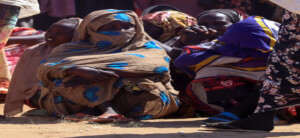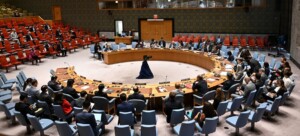WFP assessment team arrives in Sudan’s Blue Nile state
Representatives of the UN World Food Programme (WFP) have arrived in the areas controlled by the Sudan People’s Liberation Movement SPLM- N El Hilu faction to assess the humanitarian needs in Blue Nile state. The SPLAM-N described the step as the beginning of the end of the policies of the deposed Al Bashir regime.
 SPLM-N El Hilu welcomes WFP chief David Beasley to Yabus on 18 December 2019 (RD)
SPLM-N El Hilu welcomes WFP chief David Beasley to Yabus on 18 December 2019 (RD)
Representatives of the UN World Food Programme (WFP) have arrived in the areas controlled by the Sudan People’s Liberation Movement-North faction led by Abdelaziz El Hilu to assess the humanitarian needs in Blue Nile state. The rebel movement described the step as the beginning of the end of the policies of the deposed Al Bashir regime.
The arrival of the WFP team follows a visit to Yabus by WFP chief David Beasley in mid-December 2019, where he met faction leader Abdelaziz El Hilu.
In a statement, on Monday the SPLM-N welcomed the arrival of the WFP and described it as a good step toward to a peaceful resolution. “The former regime denied access to humanitarian aid organisations because they were using hunger as a weapon against civilians, which is a crime against humanity,” they added in their statement.
The movement further explained that this new development is a result of the cessation of hostilities agreement between the government and the SPLM-N. “This will pave the way for a comprehensive peace agreement,” the statement said.
The statement says that SPLM-N appreciates the role of the WFP and other UN agencies in delivering aid. They also appealed to other humanitarian organisations to help the people in the two areas (Blue Nile and Nuba Mountains) until a comprehensive peace agreement can be reached.
United Nations agencies
On 31 December 2019, six United Nations agencies arrived in the SPLM-N El Hilu-controlled areas in South Kordofan to start the process of providing humanitarian assistance.
The SPLM-N said in a statement that the agencies included Unicef, the World Food Programme, OCHA, FAO, Global Health and the UN High Commissioner for Human Rights. The statement said that mission representatives visited Kauda, and a number of service facilities, including schools, health centres, Women Union headquarters and some of the headquarters of local organisations operating in the region.
The movement says that it will allow relief through air routes, “only because of the necessity and importance of the matter”.
The SPLM-N described the move as good and “a move in the right direction to achieve peace”.
Cease fire
On December 15, the Sudanese government and the armed movements in Sudan signed a goodwill agreement to extend the Juba Declaration of Principles, which includes a cease fire, for two months.
The Political Agreement that ends on February 14, 2020 was signed by the chief negotiator of the government, Lt Gen Mohamed Hamdan ‘Hemeti’, and representatives of the rebel groups.
Roads opened
As reported by Radio Dabanga in December, the SPLM-N has agreed to open a number of roads in the Nuba Mountains.
In particular, the main roads of Heiban and Kauda, that are partly held by SPLM-N El Hilu, will be accessible for all traffic, acting governor of South Kordofan Gen Rashad Abdelhameed reported.
He said that the South Kordofan government achieved “an unprecedented breakthrough in the peace process by opening common markets and restoring confidence between the people living in areas controlled by the government and those living in rebel-held areas.
“Peace has already been achieved on the ground in South Kordofan. What remains is the official signing of the peace agreement in Juba,” he said.
The governor explained that the road to Kauda is now not only open for ordinary traffic, but also for humanitarian aid operations – though he warned that the roads need to be cleared of land mines.
Access permitted
In late September, the Sudanese government Humanitarian Aid Commission (HAC) approved a UN initiative to deliver humanitarian aid to people living in rebel-controlled areas in South Kordofan and Blue Nile state.
In October, Sudan’s Council of Ministers granted permission to the World Food Programme (WFP) to visit Kauda in South Kordofan for the first time in more than eight years. WFP Executive Director David Beasley reached Kauda on October 23.
Rebel leader El Hilu welcomed the step, and said that the permission “confirms that the old mentality of the ousted regime of Al Bashir has gone with him, and there are new people in Khartoum“.
Radio Dabanga’s editorial independence means that we can continue to provide factual updates about political developments to Sudanese and international actors, educate people about how to avoid outbreaks of infectious diseases, and provide a window to the world for those in all corners of Sudan. Support Radio Dabanga for as little as €2.50, the equivalent of a cup of coffee.












 and then
and then